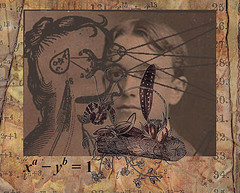Jul 2, 2009 4
Are Ethics the End of Reason?
 When someone deems your actions “unethical,” they generally mean, “your actions do not conform to a specific ethical standard’s notion of ‘right action’ and thus belong to the category of ‘wrong action’.”
When someone deems your actions “unethical,” they generally mean, “your actions do not conform to a specific ethical standard’s notion of ‘right action’ and thus belong to the category of ‘wrong action’.”
When you ask them the basis for their ethics, they will have two possible answers. On the one hand, they will refer to an authority who has established the ethical code and infer that you should abide by the code out of respect or obeisance to said authority.
On the other hand, and this is the post-enlightenment tendency, they will justify their ethical standard in terms of practical or utilitarian concerns regarding the outcome of actions deemed wrong.
Here is where conflict arises. No ethical standards can be immediately or unproblematically derived from the world of phenomena, particularly when the phenomena in question are social in nature. The ethical conclusions drawn in this way from or against any particular act are dependent both on the detailed knowledge and accurate depiction of the human situation concerned – both areas in which certainty is, for the most part, provisional.
Dispute is always possible when we are describing situations in human life and particularly when we are claiming that, “given situation x, action y, will lead to outcome z.” In the realm of science, the experimental method stipulates that exceedingly rigorous conditions be met if someone is to even make the claim, let alone experimentally verify, that, given x, action y leads to outcome z. In fact, the experimental situation is intentionally artificial, the connections between x, y, and z demonstrably tight, and the conclusions peculiarly modest.
Unfortunately, in human life, given the number of variables involved in even the simplest interaction between two people, let alone the complexities inherent in the multiple highly interdependent or even very weakly linked interactions that compromise any social process, ethical standards that are justified in terms of “inevitable” outcomes of specific actions are either trivially few or unquestionably questionable.
Yet, herein lies the conundrum. If you question the ethical standard, you are pointed to the utilitarian reason behind it. If, however, you question the utilitarian reason, you are quickly accused of questioning the ethic.
It becomes clear that the ethic itself is not seen as the product of social consensus and thus open to revision or dispute. The apparent argument from utility reverts to an argument from authority. Thus, if you are questioning the ethic, you are implicitly questioning the authority. If you are questioning the authority, you are in opposition. If you are in opposition, you are an opponent. If you are an opponent, you must be overcome.
Any conflict that cannot be resolved via dialog and compromise, must be resolved by force. While such a resolution may be “comprehensible,” to the extent that it follows the laws of physics, for example, it will not be “reasonable.”
Disputes over ethics are sad and the sadness stems from weakness. The proponents of a particular ethical standard resort to force in order to silence opponents because, sadly, they do not possess the power that could transmute their ethic into law.
Image Courtesy of “T” altered art.
